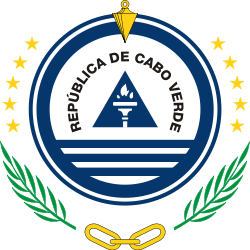Foreign relations of Cape Verde
 |
| This article is part of a series on the politics and government of Cape Verde |
|
Legislature |
|
Judiciary
|
Cape Verde follows a policy of nonalignment and seeks cooperative relations with all friendly states. Angola, Brazil, the People's Republic of China, Cuba, France, Germany, Portugal, Senegal, Russia, and the United States maintain embassies in Praia.
Cape Verde is actively interested in foreign affairs, especially in Africa. It has bilateral relations with some Lusophone nations and holds membership in a number of international organizations. It also participates in most international conferences on economic and political issues.
Bilateral relations
Angola
Cape Verde signed a friendship accord with Angola in December 1975, shortly after Angola gained its independence. Cape Verde and Guinea-Bissau served as stop-over points for Cuban troops on their way to Angola to fight UNITA rebels and South African troops. Prime Minister Pedro Pires sent FARP soldiers to Angola where they served as the personal bodyguards of Angolan President José Eduardo dos Santos.[1]
China
In January 2007, Manuel Inocêncio Sousa, Minister of Infrastructure, Transports and Sea, acknowledged the People's Republic of China's importance to Cape Verde stating,:
"China has been a friend of Cape Verde even before it gained independence from Portugal 30 years ago. Bilateral relations have been very good: in 2002, for example, the trade value between our two countries reached US $1.8 million, in Chinese exports of light industry products and miscellaneous goods."
Guinea-Bissau
The Republic of Guinea-Bissau is about 900 km south-east of Cape Verde in coastal West Africa. Both were colonies of the Portuguese Empire and they campaigned together for independence with a plan for unification, but the countries separated after 1980.[2][3]
South Korea
Establishment of Diplomatic Relations between the Republic of Korea and Cape Verde is 3 October 1988 and In 2011 Bilateral Trade were Exports $1,140,792 (Machineries, Automobile, Optical Instruments) Imports: $65,166.[4]
United States
The United States provided emergency humanitarian aid and economic assistance to Cape Verde in the period immediately following Cape Verde's independence, as well as after natural disasters, including a hurricane that struck the island of Brava in 1982, and after a severe volcanic eruption on Fogo in 1995. Cape Verde also is eligible for trade benefits under the African Growth and Opportunity Act (AGOA), and has signed an Open Skies agreement to facilitate air travel safety and expansion. On July 4, 2005, Cape Verde became the third country to sign a compact with the U.S. Government-funded Millennium Challenge Corporation (MCC); the five-year assistance package is worth over $110 million in addressing rural economic expansion, infrastructure development, and development of the credit sector.
![]() This article incorporates public domain material from the United States Department of State website http://www.state.gov/r/pa/ei/bgn/index.htm (Background Notes).
This article incorporates public domain material from the United States Department of State website http://www.state.gov/r/pa/ei/bgn/index.htm (Background Notes).
Multilateral Relations
European Union
See also
- List of diplomatic missions in Cape Verde
- List of diplomatic missions of Cape Verde
- International organization membership of Cape Verde
- International recognition of Cape Verde
References
- ↑ Lobban, Richard (1995). Cape Verde:Crioulo Colony to Independent Nation. pp. 111–112.
- ↑ MacQueen, Norrie (February 1, 2006). "Widening trajectories: Guinea Bissau and Cape Verde since independence". Relações Internacionais. Retrieved October 29, 2015.
- ↑ Mendy, Peter Karibe; Lobban, Jr., Richard A. (October 17, 2013). "Cape Verde, Relations with". Historical Dictionary of the Republic of Guinea-Bissau. Scarecrow Press. Retrieved October 29, 2015.
- ↑ http://www.mofa.go.kr/ENG/countries/middleeast/countries/20070804/1_24498.jsp?menu=m_30_50